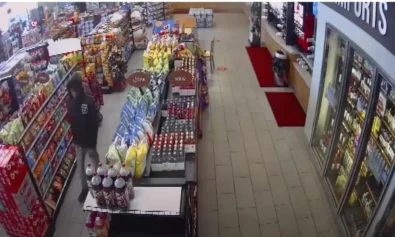While most people are asleep at 6:30 a.m., some volunteers in Ontario, California, are hard at work they define as food liberation. The grassroots organization Feed Black Futures is up at sunrise packing boxes of produce for mothers and caregivers impacted by incarceration.
“I started a fundraiser back in June of this year during the height of the pandemic when black lives continued to be under attack in this country,” said Feed Black Futures founder Ali Anderson. At roughly the project’s six-month mark, the forces behind it could see great progress.
Feed Black Futures raised $90,000 within four weeks of starting and has already delivered over 300 boxes of fruits, vegetables and other donated items to recipients in the Los Angeles area, and in a region adjacent to Los Angeles known as the Inland Empire.
“I think and I know that when you invest in communities and in farming, and food, and spaces like we have here in Huerta del Valle that really create community, that we don’t have to rely on systems that keep our people in cages and in prisons. So this project is really rooted in black liberation and abolition,” she said.
Some of the work toward pursuing this kind of freedom involves Anderson and a passionate team of volunteers packing, delivering and sometimes even picking produce sourced from Black and brown farmers. “The CSA – community supported or community-sponsored agriculture is when you get a box filled with seasonal fruits and vegetables, whatever the farm produces, whatever is in season,” Anderson explained. “It’s important to source from small-scale and medium-scale farmers to not necessarily have to rely on industrial agriculture and farmers that really use regenerative agricultural practices and farm organically.”
While the Feed Black Futures effort came from Anderson and her team, the inspiration, she said, can be credited to the ancestors. “It was actually started by Booker T. Whatley out of Tuskegee University and has a really deep legacy of black agrarian tradition,” Anderson said regarding the Alabama professor whose life work was to generate an agrarian Black middle class.
Watching Anderson and her team fill the boxes with items like peppers, oranges, turnips, kale and even a golden sunflower on top, it’s clear that the utmost care and passion goes into preparing them for families. This effort does not go unnoticed by the recipients on the other end.
When Atlanta Black Star accompanied a volunteer for a delivery to South Central Los Angeles, April Adkins, housing coordinator for A New Way of Life reentry project, met the boxes of produce with glee. “In our neighborhoods we’re not used to getting the freshness,” Adkins said. “You have to go to the other side of the 405 to get that fresh organic produce, or you have to pay a very indecent amount of money to get this,” she said. “For this population to receive this, it shows that there’s nobody better than us. We’re able to receive the same kind of freshness, the same kind of love.”
Adkins added, “Even when the boxes are packed, you can see that they’re packed up with love. We can see that the love was given to us and they want to see us healthy when a lot of things don’t want us healthy.” She added, “I’ve seen women plan meals around some of the things they knew were going to come on Wednesdays: the grains and the onion and the squash and the different vegetables that they may receive.”
Back at the farm, Anderson hopes that other organizations will be able to push for the same cause as Feed Black Futures. “My hope for this project and for other grassroots projects led by Black folks is really Black food sovereignty, which is the premise that Black folks are able to determine what goes into their food, how their food is grown and are really given land to steward,” she said. As Feed Black Futures has learned from the community farm Soul Fire Farm, she said, ‘We need to feed ourselves; we need to free ourselves.’ ”


